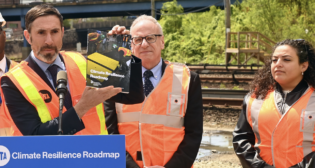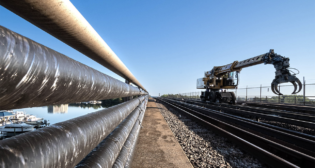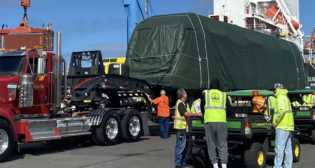
Quebec railcar fire damage assessed
Written by Douglas John BowenQuebec provincial and local officials, along with firefighters, continued struggling Monday, July 8, 2013, with the damage and death caused by a Montreal, Maine & Atlantic Railway crude oil train that derailed early Saturday in Lac-Megantic, Quebec.
The cause of the derailment still is not known. Speculation has included a “runaway train” due to alleged crew failure to properly apply handbrakes, but some suggest local vandalism and tampering by trespassers may be responsible for the event.
“If brakes aren’t properly applied on a train, it’s going to run away,” Rail World Inc. CEO Edward Burkhardt told The Canadian Press. “But we think the brakes were properly applied on this train.”
The 72-car train had been parked Friday night in Nantes, Quebec, seven miles from Lac-Megantic, where a crew switch was scheduled before the consist entered U.S. territory.
Rosemont, Ill.-based Rail World Inc. is the parent company of Hermon, Maine-based Montreal, Maine & Atlantic Railway. MM&A’s network, including trackage rights over right-of-way owned by Canadian Pacific, New Brunswick Southern Railway, and the State of Maine, runs west to east linking Montreal with locations in Vermont, Maine, and New Brunswick, as well as Quebec.
Lac-Megantic lies roughly 20 miles northwest of the Maine border and about 150 miles east of Montreal. A route map of the MM&A shows the town to be the last major station prior to MM&A’s crossing the Quebec-Maine border.
 The blast and resultant fires from the incident forced 2,000 people in Lac-Megantic to evacuate. Local media reported first responders had difficulty accessing the most heavily impacted areas. Police Sunday had confirmed the deaths of five people, with dozens more reportedly still missing. In question is whether there were tank cars with other hazardous commodities in the consist, as crude oil by itself is not known to explode. Another possibility is that natural gas pipes were severed when the tank cars derailed and piled into buildings, igniting and resulting in explosions and fire. This is what happened to at least one Queens, N.Y., beachfront community when homes were destroyed during Hurricane Sandy.
The blast and resultant fires from the incident forced 2,000 people in Lac-Megantic to evacuate. Local media reported first responders had difficulty accessing the most heavily impacted areas. Police Sunday had confirmed the deaths of five people, with dozens more reportedly still missing. In question is whether there were tank cars with other hazardous commodities in the consist, as crude oil by itself is not known to explode. Another possibility is that natural gas pipes were severed when the tank cars derailed and piled into buildings, igniting and resulting in explosions and fire. This is what happened to at least one Queens, N.Y., beachfront community when homes were destroyed during Hurricane Sandy.
The incident already has prompted Canadian Prime Minister Stephen Harper to reiterate his call for more North American oil pipeline capacity, particularly in relationship to the controversial Keystone XL pipeline plan running mid-continent from Canada to the Gulf of Mexico. Harper last May asserted that crude-by-rail is “far more environmentally challenging” than construction of new pipelines. Harper, visiting the site early Sunday, described it as a “war zone.”
But even some Canadian environmental observers question Harper’s analysis. Edward Whittingham, executive director of the Pembina Institute, an environmental group based in Calgary, told The New York Times no conclusive research comparing the safety pipelines and crude-by-rail had been made. “The best data I’ve seen indicates, depending on your perspective, both are pretty much as safe as each other, or both are equally unsafe. There’s safety and environmental risks inherent in either approach,” Whittingham said.



